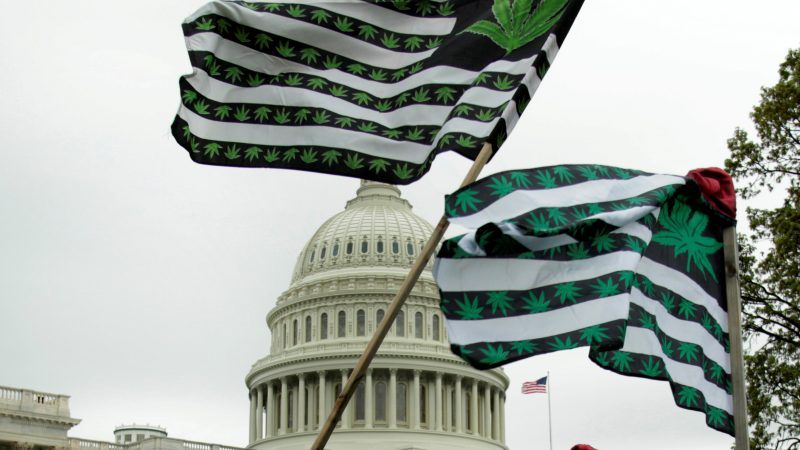The House Just Voted To Let Marijuana Businesses Legally Use Banks
It's a historic moment in Congress, but Senate support remains uncertain.

On Wednesday, the U.S. House of Representatives voted in favor of letting state-legal marijuana businesses have access to banks and other financial institutions.
It was a historic bipartisan moment, and an important one—though one that skirts the larger and more important matter of changing how the federal government treats marijuana.
The bill was the first stand-alone marijuana legalization bill to pass either chamber of Congress. The SAFE Banking Act—the acronym stands for "Secure and Fair Enforcement"—would shield banks, credit unions, and other financial institutions from being held liable for doing business with marijuana growers and pot shops in states where the drug has been legalized. Under current law, any financial institution that so much as allows a marijuana business to open a business checking account could potentially violate a host of federal banking and drug laws.
"People in states and localities across the country are voting to approve some level of marijuana use, and we need these marijuana businesses and employees to have access to checking accounts, lines of credit, payroll accounts, and more," said Rep. Ed Perlmutter (D–Colo.) during debate on the bill. "Most importantly, this will also reduce the risk of violent crime in our communities. These businesses and their employees become targets for murder, robbery, assault and more by dealing in all cash."
The bill also protects third-party vendors—like plumbers or electricians—that might have to do business with state-legal pot shops.
Rep. Patrick McHenry (R–N.C.) called the bill "one of the biggest changes to U.S. drug policy in my lifetime."
But McHenry voted against it, saying that he worries the bill could give drug cartels access to U.S. financial institutions. The SAFE Banking Act, he added, is a "half answer to a much larger question," specifically whether marijuana should remain on Schedule I of the Controlled Substances Act. That's a category that's supposed to only include drugs with "no currently accepted medical use" and "a lack of accepted safety for use"—terms that obviously do not accurately describe marijuana.
It's certainly true that Congress should have a larger debate over the federal status of marijuana, but it's also easy to see why the SAFE Banking Act is the first bill to break the seal and earn a full vote. During debate on the floor, for example, Rep. Steve Stivers (R–Ohio) voiced support for the bill while noting that he would vote against any effort to legalize marijuana nationally.
The SAFE Banking Act passed by a final vote of 321–103 (with 10 members abstaining), enough to clear the two-thirds majority required for the bill's passage under the suspension of rules that allowed it to be brought to the floor without any amendments being offered.
With the bill's passage, it moves to the Senate, where a companion bill introduced by Sen. Jeff Merkley (D–Ore.), has 33 cosponsors. That total includes only four Republicans, making passage through the upper chamber more of an open question.
Sen. Mike Crapo (R–Idaho), chairman of the Senate Banking Committee, told Politico earlier this month that he would like to hold a committee vote on the bill before the end of the year, despite the fact that he has not signed onto Merkley's bill.
But neither the larger questions surrounding Congress' slow-walking of the end of the federal war on marijuana nor the fate of the SAFE Banking Act in the Senate should take away from the significance of Wednesday's vote, which gave members of Congress their first chance to affirmatively vote for legalization and regulation of marijuana businesses over the decadeslong failed efforts of prohibition.
"For the first time ever, a supermajority of the House voted affirmatively to recognize that the legalization and regulation of marijuana is a superior public policy to prohibition and criminalization," said Justin Strekal, political director for NORML, a national marijuana legalization advocacy organization, in a statement. The group is "cautiously optimistic" about the bill's future in the Senate, he said.
"American voters have spoken and continue to speak," said Perlmutter just before the vote. "Prohibition is over."


Show Comments (36)